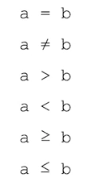Unit 3 Sections 5-7
Vocab
- Boolean: a data type with two possible values: true or false
- Logical Operators: these types of operators don't necessarily deal with equivalent/non-equivalent values
- Conditionals
- Selection: Uses a condition that evaluates to true or false
- determines which part of an algorithm are executed based on a condition being true or false
- Algorithm is a finite set of instructions that accomplish a specific task
- Nested Conditionals: consist of conditional statements within other conditional statements
- Relational Operators
- The AP exam will provide a ref sheet with these operators:

- The AP exam will provide a ref sheet with these operators:
grade1 = 90
grade2 = 65
grade3 = 60
grade4 = 75
grade5 = 95
totalGrade = grade1 + grade2 + grade3 + grade4 + grade5
avgGrade = totalGrade/5
if avgGrade > 80:
print("The avf grade was " + avgGrade)
else:
print("the avg grade was not greater than 80 :(. It was " + str(avgGrade))
- Logical Operators
- these types of operators don't necessarily deal with equivalent/non-equivalent values.
- Instead they work on operands to produce a singular boolean result
- AND: returns TRUE if the operands around it are TRUE
- OR: returns TRUE if at least one operand is TRUE
- NOT: returns TRUE if the following boolean is FALSE
print("1 > 2 or 5 < 12:", 1 > 2 or 5 < 12)
# Output TRUE using OR ^
# Output FALSE using NOT
print("7 > 8:", not 7 > 8)
# Output FALSE using AND
print("10 > 20:", 10 > 20 and False)
- Conditionals
- Selection: Uses a condition that evaluates to true or false
- determines which part of an algorithm are executed based on a condition being true or false
- Algorithm is a finite set of instructions that accomplish a specific task

- Conditional Statements
- also known as if statements
x = 20
y = 10
if x > y:
print("x is greater than y")
else:
print("x is not greater than y")
num1 = 100
num2 = 100
sum = num1 + num2
if sum == 200:
print(sum)
else:
print(sum)
- Nested Conditionals
- consist of conditional statements within other conditional statements
- uses "if else" statements within "if else" statements

HW
- Write a program that fits these conditions using nested conditionals:
- If the product is expired, print "this product is no good"
- If the cost is above 50 dollars, and the product isn't expired, print "this product is too expensive"
- If the cost is more than 25 dollars but under 50, and the product isn't expired, print "this is a regular product"
- If the cost is under 25 dollars, print "this is a cheap product"
infoP = []
infoP.append({
"Product": "Cheese",
"Expired": True,
"Cost": 15,
})
infoP.append({
"Product": "Wine",
"Expired": False,
"Cost": 75,
})
def print_info(p_rec):
if (p_rec["Expired"]):
print("\t", "This product is no good")
else:
if (p_rec["Cost"] > 50):
print("\t", "This product is too expensive")
elif (p_rec["Cost"] > 25 and p_rec["Cost"] <= 50):
print("\t", "This is a regular product")
else:
print("\t", "This is a cheap product")
def print_data(p_rec): #formatting
print("\t", "Product:", p_rec["Product"])
print("\t", "Expired:", p_rec["Expired"])
print("\t", "Cost:", p_rec["Cost"])
print_info(p_rec)
print("\n")
def data_entry(): #defining the function that asks for user input
product = input("What is the product? (one word)")
expired_string = input("Is it expired? (True or False)")
cost = input("How much did it cost(dont include $, round to nearest whole number)")
if (expired_string == "True"):
expired = True
else:
expired = False
infoP.append({ #appends the user input to the dictionary
"Product": product,
"Expired": expired,
"Cost": int(cost),
})
def main():
Continue = True #defining continue as true
while Continue:
inp = input("Would you like to add a product to the database, type no if you want to exit)?")
if inp == "no":
print("Come back again!")
Continue = False
elif inp == "add":
data_entry()
else:
print("Invalid input. Please try again")
length = len(infoP) #defines length as the number of records
print("Total Number of Records: ", length)
for record in infoP:
print_data(record)
main()
- Create a multiple choice quiz that ...
- uses Boolean expressions
- uses Logical operators
- uses Conditional statements
- prompts quiz-taker with multiple options (only one can be right)
- has at least 3 questions
import getpass
def question_with_response(prompt): #defines question_with_response
print("Question: " + prompt) #prints the question to the user
msg = input() #takes the user's input
return msg #returns the user's input as a printed answer
def question_and_answer(prompt):
print("Question: " + prompt)
msg = input()
print("Answer: " + msg)
questions = 3
correct = 0
print('Hello, ' + getpass.getuser())
print("You will be asked " + str(questions) + " questions.") #str(questions) turns the number 3 that is = to questions into a string that can be printed
rsp = question_with_response("Have humans ever reached the moon? False True") #asks the question in terminal
if (rsp == "True"):
print(rsp + " is correct!") #prints "is correct" if the rsp was correct
correct += 1
else:
print(rsp + " is incorrect!")
rsp = question_with_response("How many hearts does an octopus have? a. 8 b. 4 c. 3 d. 1")
if rsp == "c":
print(rsp + " is correct!")
correct += 1
else:
print(rsp + " is incorrect!")
rsp = question_with_response("Which of the following countries have won the world cup?(Type your answer separated by ',') a. Brazil b. France c. Japan d. China")
# rsp = "a,b"
if ("a" in rsp) and ("b" in rsp) and ("c" not in rsp) and ("d" not in rsp):
print(rsp + " is correct!")
correct += 1
else:
print(rsp + " is incorrect!")
print("You got " + str(correct) + " out of 3")